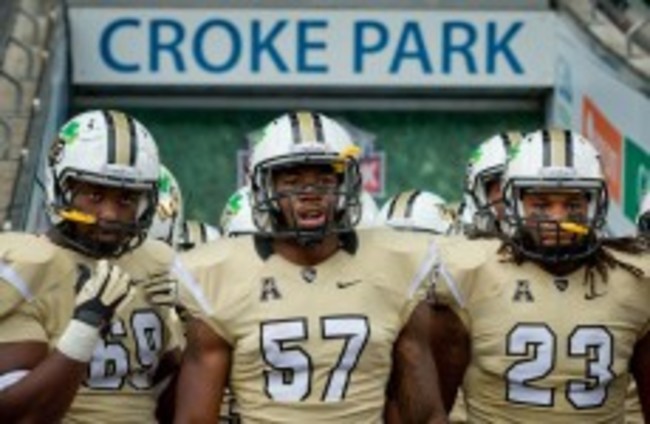WITHIN MINUTES OF yesterday’s news that the 2016 Croke Park Classic, as originally envisaged, would not be going ahead, The42 received correspondence from the Restaurants Association of Ireland stating the move was a “huge blow to tourism in Ireland” and that the food sector alone would miss out on €15 million in revenue.
This may be a slight exaggeration – documentation from the Department of Transport, Tourism and Sport (DTTAS) previously seen by The42 indicates the total value to these games to the local economy is closer to €25 million by their estimations – but the point still stands.
Anyone who owns a restaurant, hotel, taxi, shop or pub, right down to the people who sell flags and scarves and bottles of water outside the stadium are potentially missing out on a financial windfall next year and all over a relatively insignificant amount of money, at least in terms of what the games generate.
Warning signs
We first broke the news Boston College and Georgia Tech would bring collegiate American football back to Croke Park – albeit on a different date to avoid any clashes with the GAA calendar — in December 2014, the second in a proposed series of three games at the venue and following on from Penn State’s win over the University of Central Florida (UCF) last August.
While the venue refused to confirm the news at the time, stadium director Peter McKenna told The42 in February he wanted Croke Park to become the European capital of college American football in the same way London has taken that title for the NFL.
McKenna said:
“We’re talking to Boston College and and they’re suggesting Georgia Tech as being the opposition,” outlined McKenna. “As I say, we haven’t agreed contracts yet.
“I’d hope to have it finalised by the end of March. We haven’t settled on a date yet.”
However, while the first sign the game may be in trouble came when Enda Kenny failed to officially announce it during his St. Patrick’s Day trip to the United States, it was our understanding that most parties involved felt a deal could be reached soon.
The main stumbling block was, and remains, the strength of the US dollar, meaning any deal provisionally agreed even in January this year, would cost Croke Park more to fund this month.
For example — and this really is just an example — say the GAA agreed in January to pay Boston College $1,000,000 for being the home team. The difference between the cost to the organisation then ($1.19 = €1) and today ($1.08 = €1) is €85,589.
Again, these are not the figures involved.
However, The42 understands the sum is less than €500,000 and a while the GAA statement said the event was “was no longer viable for the association without significant support from government agencies” it is understood that private funding is also being sought to make up the shortfall.
If private sponsorship is not secured, it’s not known if the Government will step in.
A statement from the DTTAS today says “decisions in relation to tourism funding are operational matters for the relevant agencies and the Department is not directly responsible for expenditure decisions” that doesn’t stop visiting teams from asking for it.
It’s worth noting that before the Emerald Isle Classic — an event sponsored by The Gathering — Navy sought funding from the Irish government of €390,000 for their hotels and flights as well as unspecified amount for the full rental cost of the Aviva stadium.
In May 2013, UCF wrote to the then Minister, Leo Varadkar TD, to request €1.5 million from the department to “assist with the travel expenses for both teams and universities as well as many operational and promotional expenses.”
It is not known if either request was approved.
The future
Whether or not the 2016 Croke Park Classic can be rescued remains to be seen. Even if it is, it is unlikely to involve the two teams first proposed. However, sources close to the negotiations remain hopeful McKenna’s vision of Headquarters as the European capital of college American football is viable especially as one of the 2018 teams is already provisionally on board.
As yesterday’s announcement shows, the challenges involved in putting on these events are not insignificant, however, those close to the game believe they are not insurmountable either.











Diff type of footballer these days and they aint any better they are not even good enough to stand beside Stevie/keano/,viera/scholes . All them men played ball and took and gave a tackle. All thats there now with exception of one or two is a glorified bunch of mammy boys
Bang on from Gerrard. Mings tackle looked like a sore one, may have even injured Saka badly but it was just bad luck and that’s part of contact sport! The game as a spectacle has been majorly dented by soft officiating over the past 10 years lets not make it even worse.
So just because Gerrard has screws in his hips and 16 different operations that’s means that every English player from now on needs to end up like him or they haven’t had it ‘tough’ enough. What a silly comment from Gerrard. Probably said in the heat of the moment after the defeat I hope!
@kev egan: No he’s highlighting that it’s still a contact sport. To many fairies like saka expecting a foul every time they fall down cause someone breathed on them while running. Not every bit of physical contact is a foul. It’s not basketball
@Phil Redmond: fairies….
There’s clips of Gerrard saying his Rangers players need more protection..
I’m sure Stevie would be telling Saka to toughen up if he was a Villa player…
Twas an awful fall in fairness Steve,Glad ur ok…
I’m a huge fan of Stevie but this attitude of ‘fairies vs tough men’ is nonsense. Villa kicked him off the pitch, Mings was lucky not to see red. Players who rough up players and repeatedly foul are not tough…. they’re a bit rubbish at football is all.